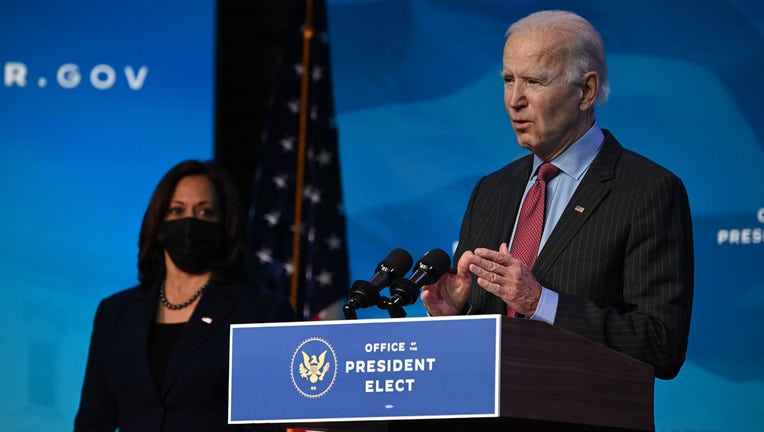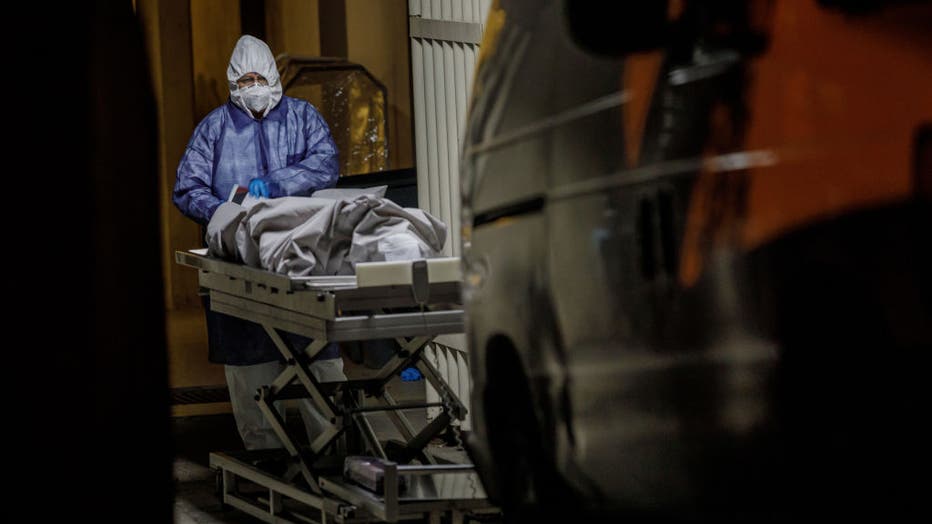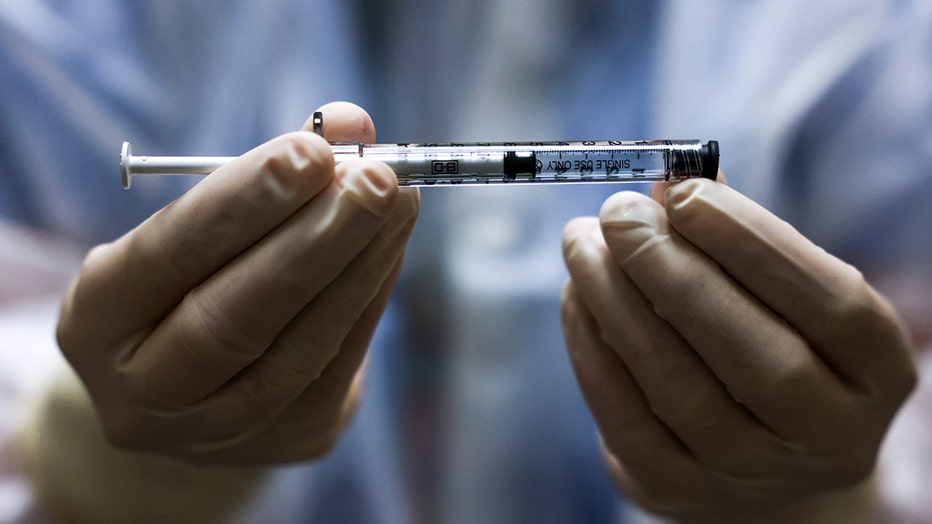Biden unveils $1.9T COVID plan, including $1,400 checks

President-elect Joe Biden with Vice President-elect Kamala Harris (Photo by JIM WATSON/AFP via Getty Images)
WILMINGTON, Del. (AP) - Saying the nation faces "a crisis of deep human suffering," President-elect Joe Biden unveiled a $1.9 trillion coronavirus plan Thursday to turn the tide on the pandemic, speeding up vaccines and pumping out financial help to those struggling with the prolonged economic fallout.
Called the "American Rescue Plan," the legislative proposal would meet Biden's goal of administering 100 million vaccines by the 100th day of his administration, while advancing his objective of reopening most schools by the spring. On a parallel track, he believes it will deliver another round of aid to stabilize the economy while the public health effort seeks the upper hand on the pandemic.
"I know what I just described does not come cheaply, but we simply can’t afford not to do what I’m proposing," Biden said in a nationwide address. "If we invest now boldly, smartly and with unwavering focus on American workers and families, we will strengthen our economy, reduce inequity and put our nation’s long-term finances on the most sustainable course."
His plan includes $1,400 checks for most Americans, which on top of $600 provided in the most recent COVID-19 bill would bring the total to the $2,000 that Biden has called for. It would also extend a temporary boost in unemployment benefits and a moratorium on evictions and foreclosures through September.
And it shoehorns in long-term Democratic policy aims such as increasing the minimum wage to $15 an hour, expanding paid leave for workers, and increasing tax credits for families with children. The last item would make it easier for women to go back to work, which in turn would help the economy recover.

Senate Minority Leader Chuck Schumer (Photo by SAUL LOEB/AFP via Getty Images)
The political outlook for the legislation remained unclear. In a joint statement, House Speaker Nancy Pelosi and Senate Democratic leader Chuck Schumer praised Biden for including liberal priorities, saying they would move quickly to pass it. But Democrats have narrow margins in both chambers of Congress and Republicans will push back on issues that range from increasing the minimum wage to providing more money for states, while demanding inclusion of their priorities, such as liability protection for businesses.
"Remember that a bipartisan $900 billion #COVID19 relief bill became law just 18 days ago," tweeted Sen. John Cornyn, R-Texas. But Biden said that was only a down payment, and he promised another major bill next month, focused on rebuilding the economy.
His relief bill would be paid for with borrowed money, adding to trillions in debt the government has already incurred to confront the pandemic. Aides said Biden will make the case that the additional spending and borrowing is necessary to prevent the economy from sliding into an even deeper hole. Interest rates are low, making debt more manageable.

(Marcus Yam / Los Angeles Times via Getty Images)
Biden has long held that economic recovery is inextricably linked with controlling the coronavirus. "Our work begins with getting COVID under control," he declared in his victory speech. "We cannot repair the economy, restore our vitality or relish life’s most precious moments until we get it under control."
The plan comes as a divided nation is in the grip of the pandemic’s most dangerous wave yet. So far, more than 385,000 people have died of COVID-19 in the U.S. And government numbers out Thursday reported a jump in weekly unemployment claims, to 965,000, a sign that rising infections are forcing businesses to cut back and lay off workers.
Under Biden's multipronged strategy, about $400 billion would go directly to combating the pandemic, while the rest is focused on economic relief and aid to states and localities.

COVID-19 vaccine (Michael Ciaglo/Getty Images)
About $20 billion would be allocated for a more disciplined focus on vaccination, on top of some $8 billion already approved by Congress. Biden has called for setting up mass vaccination centers and sending mobile units to hard-to-reach areas.
The plan provides $50 billion to expand testing, which is seen as key to reopening most schools by the end of the new administration's first 100 days. About $130 billion would be allocated to help schools reopen without risking further contagion.
The plan would fund the hiring of 100,000 public health workers, to focus on encouraging people to get vaccinated and on tracing the contacts of those infected with the coronavirus.
There's also a proposal to boost investment in genetic sequencing, to help track new virus strains including the more contagious variants identified in the United Kingdom and South Africa.
FREE DOWNLOAD: Get breaking news alerts in the FOX6 News app for iOS or Android
Throughout the plan, there's a focus on ensuring that minority communities that have borne the brunt of the pandemic are not shortchanged on vaccines and treatments, aides said.
With the new proposals comes a call to redouble efforts on the basics.
Biden is asking Americans to override their sense of pandemic fatigue and recommit to wearing masks, practicing social distancing and avoiding indoor gatherings, particularly larger ones. It's still the surest way to slow the COVID-19 wave, with more than 4,400 deaths reported just on Tuesday.
Biden's biggest challenge will be to "win the hearts and minds of the American people to follow his lead," said Dr. Leana Wen, a public health expert and emergency physician.

Dr. Pothof explains the new coronavirus variant found in Wisconsin
We've learned a new variant of the coronavirus, which is spread more easily, has popped up in Wisconsin. UW Health's Chief Quality Officer Dr. Jeff Pothof explains more.
With the backing of Congress and the expertise of private and government scientists, the Trump administration has delivered two highly effective vaccines and more are on the way. Yet a month after the first shots were given, the nation's vaccination campaign is off to a slow start with about 10.3 million people getting the first of two shots, although more than 29 million doses have been delivered.
Biden believes the key to speeding that up lies not only in delivering more vaccine but also in working closely with states and local communities to get shots into the arms of more people. The Trump administration provided the vaccine to states and set guidelines for who should get priority for shots, but largely left it up to state and local officials to organize their vaccination campaigns.
"This is going to entail coordination at all levels, as well as resources," said Dr. Nadine Gracia, executive vice president of the nonpartisan Trust for America's Health. "There is a commitment the (incoming) administration has articulated to address the needs of communities."
Biden has set a goal of administering 100 million shots in his first 100 days. The pace of vaccination is approaching 1 million shots a day, but 1.8 million a day would be needed to reach widespread or "herd" immunity by the summer, according to a recent estimate by the American Hospital Association. Wen says the pace should be even higher — closer to 3 million a day.
It's still unclear how the new administration will address the issue of vaccine hesitancy, the doubts and suspicions that keep many people from getting a shot. Polls show it's particularly a problem among Black Americans. "It's important to acknowledge the reasons why it exists and work to earn trust and build vaccine confidence in communities," said Gracia.
Next Wednesday, when Biden is sworn in as president, marks the anniversary of the first confirmed case of COVID-19 in the United States.

